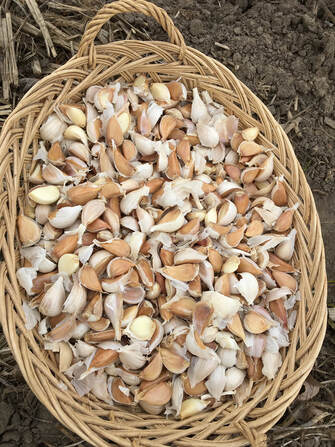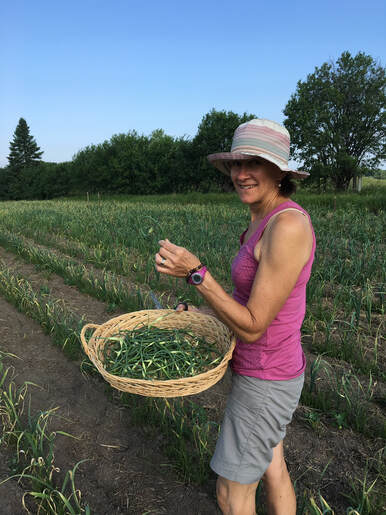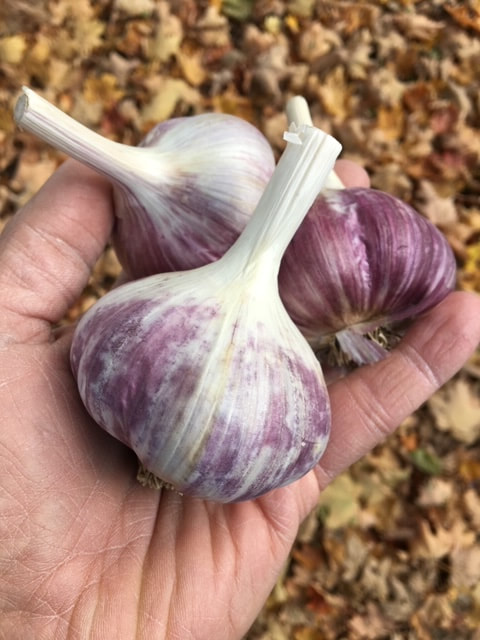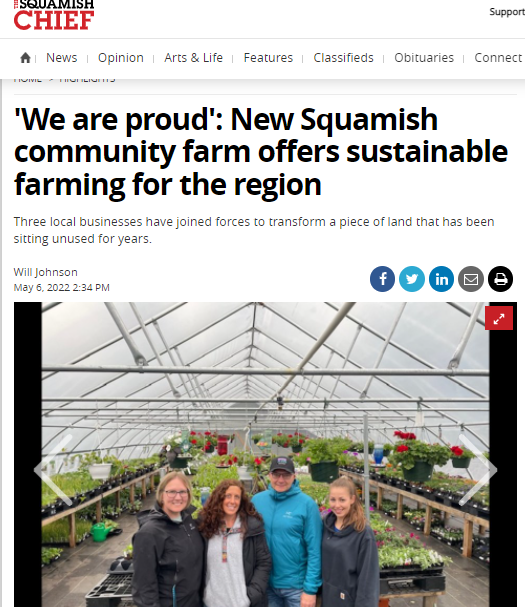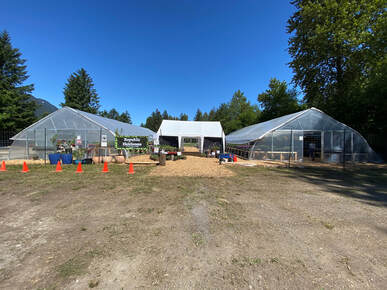
Common Acres Community Farm
Squamish CAN has established the region's first community farm on one acre of underutilized ALR land on Easter Seals grounds, located centrally in Squamish, BC. Common Acres Community Farm is subleasing ¼ acre plots to new entrant farmers in partnership with Young Agrarians. We officially launched in spring 2022 with three new farm businesses in operation:
● Rebecca Bolkowy & Nick Bolkowy from @localrootsfarmbc (previously Republic Heirlooms)
● Vince Hoog from Fieldstone Garlic
● Amanda Bagliore from @aura_rosa_florals
The project goal is to expand and encourage sustainable agriculture and food production in our region, as identified in the Squamish Valley Agricultural Plan and by the Squamish to Lillooet Food Task Force.
Why Community Farming?
Community farms provide affordable land access options to farmers, through non-ownership models, such as long-term leases and incubator plots. A main barrier to local food production in the BC Southern mainland is the high cost of land, making it difficult for new entrant farmers looking to enter the profession (Wittman et al, 2017). Non-ownership models offer a good way for farmers to overcome the structural and economic barriers associated with land ownership. Community farms use non-ownership and shared access models to increase community participation on and off the land, which reflects the food sovereignty philosophy that land is a community asset, rather than a commodity, and that farmers and their livelihoods need to be valued and protected, rather than eliminated (Nyéléni Forum for Food Sovereignty, 2007). This project contributes to growing our rural community food assets and increasing access and availability to locally grown food and agri-food employment opportunities.
The benefits of providing affordable lands to farmers directly improves access for residents to have locally grown food or value added products year round. There is a direct link between locally grown food access that provides nutritious and nutrient dense foods that overall improve the health of our community. The South West of BC has seen severe impacts of climate change over the past decade and in particular during 2021. Atmospheric Rivers damaged transportation routes, thus shutting down access to communities getting food. The need for communities to have resiliency in light of moderate to severe climate change impacts are essential. And increasing access to farming and supporting more farmers in our community will significantly help us with that. We are considered a rural community, with some residents including Indigenous communities living in the north valley’s of Squamish (Squamish Valley & Paradise Valley). We are dependent on the major hwy 99, waterways and rail to access our food and currently only have less than six commercial farmers in Squamish growing food.
The Common Acres Community Farm has provided a visual and experience for us to help leverage to secure more land. Eventually, we hope that these properties will be held in a land trust or in perpetuity as space to feed our community members.
Community Farming Benefits
Healthy Local Economies: Community farms are locally owned and operated, and democratically controlled. Local farms keep money circulating in their communities rather than exporting it to absentee owners or shareholders, and the benefits are passed on to local restaurants, farmers markets, retailers, and consumers.
Environmental Solutions: Agriculture and farming practices can both harm and protect environmental systems and processes. Groups that farm cooperatively feel a strong sense of stewardship and responsibility to the land, but farmers do face barriers when they choose to farm sustainably. By basing their agricultural activities on sustainable practices, community farms balance environmental sustainability with retention and protection of valuable and threatened farmland.
Local Food Security: Rural communities import much of their food. In the context of a global food crisis, establishing local suppliers of diverse food products increases food security in small rural communities. Communities that invest in community farms help secure farmland and build local food systems for ongoing food production.
Market Stability: When a community invests in a farm, its long-term viability and security as a food production (and social) system are supported. Farmers benefit from market and price stability when communities support their farmers through community shared agriculture programs, farmers markets, and local distribution networks.
Social Capital and Community Amenities: Community farms build 'social capital' by involving a diverse group of individuals – farmers, community members, and organizations – with different skills and knowledge. This social capital, or wealth, helps create community amenities beyond food production, including environmental and agricultural education, recreational opportunities, and nature conservation areas.
Source: Community Farming Benefits (communityfarms.ca)
For more information about community farming, please contact our Executive Director, [email protected].
Squamish CAN has established the region's first community farm on one acre of underutilized ALR land on Easter Seals grounds, located centrally in Squamish, BC. Common Acres Community Farm is subleasing ¼ acre plots to new entrant farmers in partnership with Young Agrarians. We officially launched in spring 2022 with three new farm businesses in operation:
● Rebecca Bolkowy & Nick Bolkowy from @localrootsfarmbc (previously Republic Heirlooms)
● Vince Hoog from Fieldstone Garlic
● Amanda Bagliore from @aura_rosa_florals
The project goal is to expand and encourage sustainable agriculture and food production in our region, as identified in the Squamish Valley Agricultural Plan and by the Squamish to Lillooet Food Task Force.
Why Community Farming?
Community farms provide affordable land access options to farmers, through non-ownership models, such as long-term leases and incubator plots. A main barrier to local food production in the BC Southern mainland is the high cost of land, making it difficult for new entrant farmers looking to enter the profession (Wittman et al, 2017). Non-ownership models offer a good way for farmers to overcome the structural and economic barriers associated with land ownership. Community farms use non-ownership and shared access models to increase community participation on and off the land, which reflects the food sovereignty philosophy that land is a community asset, rather than a commodity, and that farmers and their livelihoods need to be valued and protected, rather than eliminated (Nyéléni Forum for Food Sovereignty, 2007). This project contributes to growing our rural community food assets and increasing access and availability to locally grown food and agri-food employment opportunities.
The benefits of providing affordable lands to farmers directly improves access for residents to have locally grown food or value added products year round. There is a direct link between locally grown food access that provides nutritious and nutrient dense foods that overall improve the health of our community. The South West of BC has seen severe impacts of climate change over the past decade and in particular during 2021. Atmospheric Rivers damaged transportation routes, thus shutting down access to communities getting food. The need for communities to have resiliency in light of moderate to severe climate change impacts are essential. And increasing access to farming and supporting more farmers in our community will significantly help us with that. We are considered a rural community, with some residents including Indigenous communities living in the north valley’s of Squamish (Squamish Valley & Paradise Valley). We are dependent on the major hwy 99, waterways and rail to access our food and currently only have less than six commercial farmers in Squamish growing food.
The Common Acres Community Farm has provided a visual and experience for us to help leverage to secure more land. Eventually, we hope that these properties will be held in a land trust or in perpetuity as space to feed our community members.
Community Farming Benefits
Healthy Local Economies: Community farms are locally owned and operated, and democratically controlled. Local farms keep money circulating in their communities rather than exporting it to absentee owners or shareholders, and the benefits are passed on to local restaurants, farmers markets, retailers, and consumers.
Environmental Solutions: Agriculture and farming practices can both harm and protect environmental systems and processes. Groups that farm cooperatively feel a strong sense of stewardship and responsibility to the land, but farmers do face barriers when they choose to farm sustainably. By basing their agricultural activities on sustainable practices, community farms balance environmental sustainability with retention and protection of valuable and threatened farmland.
Local Food Security: Rural communities import much of their food. In the context of a global food crisis, establishing local suppliers of diverse food products increases food security in small rural communities. Communities that invest in community farms help secure farmland and build local food systems for ongoing food production.
Market Stability: When a community invests in a farm, its long-term viability and security as a food production (and social) system are supported. Farmers benefit from market and price stability when communities support their farmers through community shared agriculture programs, farmers markets, and local distribution networks.
Social Capital and Community Amenities: Community farms build 'social capital' by involving a diverse group of individuals – farmers, community members, and organizations – with different skills and knowledge. This social capital, or wealth, helps create community amenities beyond food production, including environmental and agricultural education, recreational opportunities, and nature conservation areas.
Source: Community Farming Benefits (communityfarms.ca)
For more information about community farming, please contact our Executive Director, [email protected].
- Media Release - Community Farming in Squamish 2022
- Squamish Chief: 'We are proud': New Squamish community farm offers sustainable farming for the region
Supporters

A special thank you to Easter Seals Camp Squamish for working with us. Without their support and use of land, development of the Common Acres Community Farm would not be possible.

